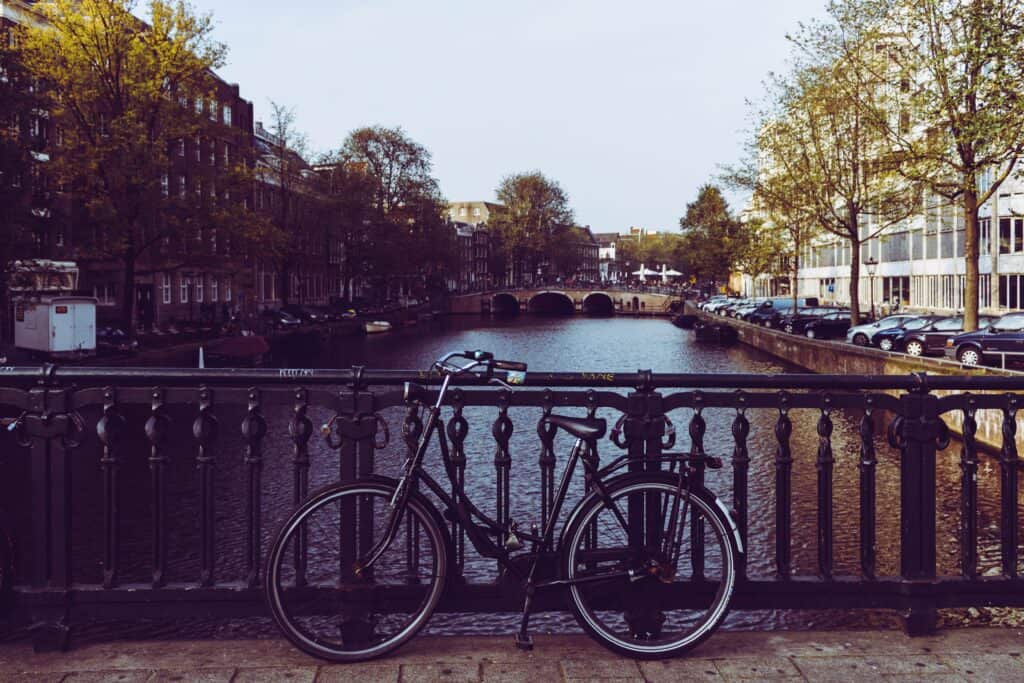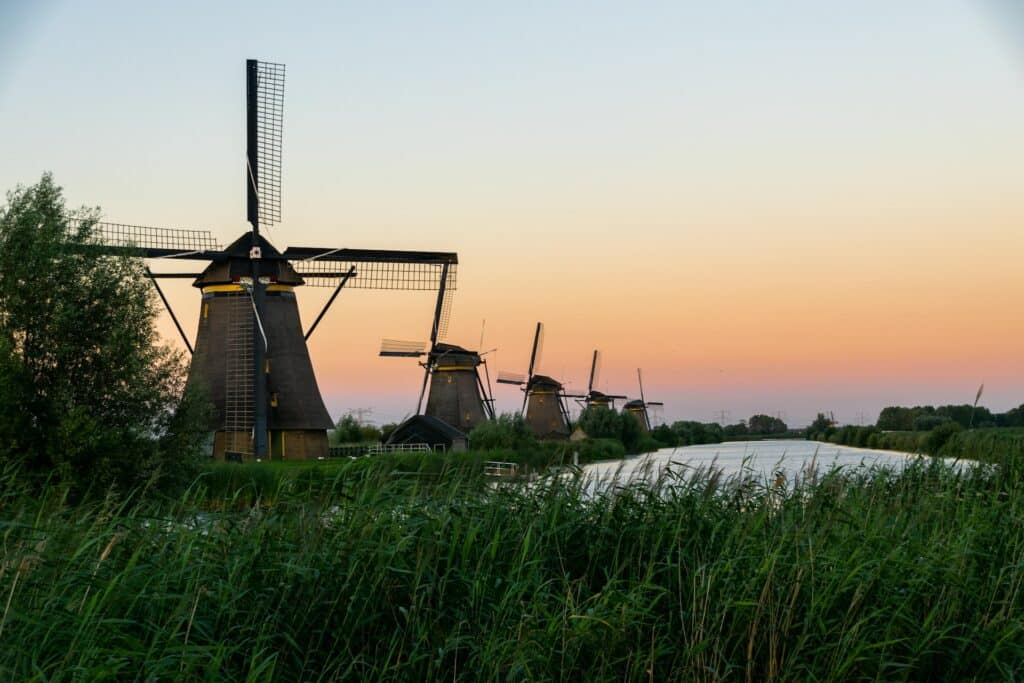
Back in 2004 I lived in Amsterdam for a year.
If it wasn’t for the leaves you’d be able to see the apartment we rented in the top left corner of this photo.
It was a wonderful year! Too good in fact. When I had to go back to Eindhoven, a less glamorous dutch city, my girlfriend (now wife) promptly moved to London to go back to uni.
She was right of course, our time in Holland peaked in Amsterdam. Work was good. Life was great!
We lived on a top floor apartment on the Prinsengracht, the outer of the three canals that wrap the inner city. On Sunday mornings the only sounds you could hear were church bells, trams winding their way up the Utrechsestraat and bicycles clattering the omnipresent speed bumps.
I cycled more in that year than I ever have in my life. To the brown cafes of the Jordaan for a drink, to the Albert Cuyp market for food and to the Vondelparkt for a picnic, or to check out a gallery (or brewery). And Amsterdam isn’t even that good for cycling by Dutch standards, Groningen owns it.
If you moved to Holland you would cycle more too.
You’d never wear a helmet. You’d always check your blind spot for bikes when turning a corner in a car. You’d cycle drunk (and be pretty safe doing it). You’d have your bike stolen, then stolen again. You’d sit up straight with handlebars that twist towards you. You’d give a friend a lift on your bike, and be given one by them on theirs. And you’d marvel at the unparalleled ability of dutch women to look fashionable while cycling.
But most of all you . . would . . cycle. Because you’d be in Holland. And that is just how they roll.
5 Reasons the Dutch Are Queens of the Bike

I loved my year in Amsterdam, but I’m not looking at the data through rose tinted glasses. Pick any metric you want and the Dutch crush it.
The Dutch do a greater share of trips by bike, cycle further each day, more young people cycle, they have fewer injuries per distance cycled and more women cycle than men.
In fact it is the only country I know of where women are Queens of the Bikepath, that is more women cycle than men.
The Netherlands is a small country located in northwest Europe, bordered by Germany to the east and Belgium to the south. A country with a population of just over 17 million people, the Netherlands is known for its vibrant culture and beautiful scenery. One of the most distinctive features of the Netherlands is its use of bicycles as a primary form of transportation.
The use of bicycles in the Netherlands dates back to the late 19th century, when a number of bicycle-sharing systems were established in larger cities. As the popularity of bicycles grew, so did the infrastructure around them. Today, bicycles are a major part of everyday life in the Netherlands, with over 22 million bicycles used by the Dutch people.
There are a number of benefits to using bicycles as a form of transportation. For one, they are much more economical than cars. With the cost of gasoline and maintenance rising, bicycles are becoming a more attractive option for people looking to save money on transportation. In addition, bicycles are much more environmentally friendly than cars, as they produce no emissions and require no fuel. Finally, cycling is a great form of exercise that can help improve physical and mental health.
Bicycles are not just a means of transportation in the Netherlands, they are also a way of life. The Dutch have a deep-rooted cycling culture, with many people using their bicycles as a primary form of transportation to work, school, and other activities. The country also has an extensive network of bike lanes and paths that make cycling safe and efficient.
Ok, so without further delay, here are 5 reasons why the Dutch are the Queen of the bicycle.
1. Extensive Cycling Infrastructure: The Netherlands is known for its extensive cycling infrastructure, with over 35,000 km of bike lanes and paths. This makes cycling a safe, efficient, and enjoyable form of transportation. Interestingly, e-scooters are increasingly popular in the Netherlands as well.
2. Culture: Cycling is deeply rooted in Dutch culture and is seen as a normal part of everyday life. This is reflected in the number of people who use bikes as their primary form of transportation.
3. Safety: The Netherlands has one of the lowest rates of traffic fatalities in the world, largely due to its focus on cycling safety. The country has strict laws and regulations that ensure cyclists are safe and protected on the roads.
4. Health Benefits: Cycling is a great form of exercise and has numerous health benefits, including improved physical and mental health. The Dutch people are known for being some of the healthiest in the world, and cycling is likely a major factor in this.
5. Economic Benefits: Bicycles are much more economical than cars, and can save people money on fuel and maintenance costs. In addition, the country’s cycling infrastructure has created jobs in the cycling industry and has had a positive economic impact on the country.
In conclusion, bicycles are a major part of life in the Netherlands that offer numerous benefits. They are economical, environmentally friendly, and a great form of exercise. The Dutch culture and infrastructure around cycling make it a viable option for transportation, and the country can serve as a model for other countries looking to incorporate bicycles into their transportation system.
Lindsay Wilson
I founded Shrink That Footprint in November 2012, after a long period of research. For many years I have calculated, studied and worked with carbon footprints, and Shrink That Footprint is that interest come to life.
I have an Economics degree from UCL, have previously worked as an energy efficiency analyst at BNEF and continue to work as a strategy consultant at Maneas. I have consulted to numerous clients in energy and finance, as well as the World Economic Forum.
When I’m not crunching carbon footprints you’ll often find me helping my two year old son tend to the tomatoes, salad and peppers growing in our upcycled greenhouse.
